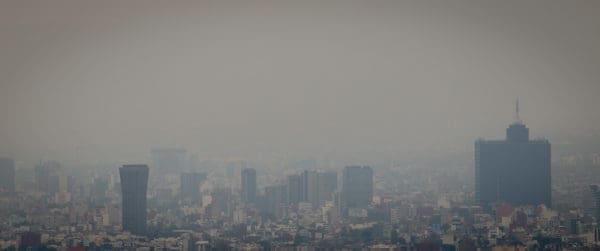The Right and the Environment
Chris Roberts, American Renaissance, October 29, 2020

Photo taken on March 17, 2016 shows the view of the dense smog layer covering Mexico City. (Credit Image: © Xinhua via ZUMA Wire)
Environmentalism is important to the Left. Democrats have proposals to protect the natural world, such as the various “Green New Deals,” and they say the GOP is the pawn of businesses that want the “right to pollute.” The last two Republican Presidents refused to join international agreements to fight climate change (the Kyoto Protocol and the Paris Agreement), which the Left considers proof that conservatives don’t care about the environment.
The Left has a point. Almost every time a proposal to protect the environment comes around, Republicans oppose it, claiming it will hurt the economy. Fighting Democrat policies is the only GOP policy on the environment. It never proposes its own ideas; only revised, business-friendly, versions of what the Left proposes. Presumably, this strategy satisfies many of the GOP-supporting industries that fear overregulation, but it does not appeal to average citizens who worry about deforestation, pollution, endangered species, etc.
Historically, environmentalism was conservative. In the early 20th century, the same people supported eugenics, immigration restriction, and environmentalism. Madison Grant, the godfather of modern white advocacy, “worked just as ardently to preserve the natural heritage for future generations of Americans.” Grant was involved in conservationist groups that persuaded Republican President Teddy Roosevelt to use government power to protect the natural world. TR was the most environmentalist president in American history:
After becoming president in 1901, Roosevelt used his authority to protect wildlife and public lands by creating the United States Forest Service (USFS) and establishing 150 national forests, 51 federal bird reserves, 4 national game preserves, 5 national parks, and 18 national monuments by enabling the 1906 American Antiquities Act. During his presidency, Theodore Roosevelt protected approximately 230 million acres of public land. . . . Roosevelt was also the first president to create a Federal Bird Reserve, and he would establish 51 of these during his administration. These reserves would later become today’s national wildlife refuges
TR was a hunter and war veteran, a patriot eager to flex America’s might — even if it meant war — and a proud white man. As President, he signed two bills that restricted immigration, and arranged the informal “Gentlemen’s Agreement of 1907” that ended Japanese immigration. Madison Grant influenced these positions as well, and the Immigration Act of 1907 was eugenic:
That the following classes of aliens shall be excluded from admission into the United States: All idiots, imbeciles, feebleminded persons, epileptics, insane persons, and persons who have been insane within five years previous; persons who have had two or more attacks of insanity at any time previously; paupers; persons likely to become a public charge; professional beggars; persons afflicted with tuberculosis or with a loathsome or dangerous contagious disease; persons not comprehended within any of the foregoing excluded classes who are found to be and are certified by the examining surgeon as being mentally or physically defective, such mental or physical defect being of a nature which may affect the ability of such alien to earn a living . . . .
A century ago, degradation of the natural world and degradation of the founding stock were twin issues. They still are.

A young Teddy Roosevelt.
Mass immigration hurts the environment. Republicans who oppose it should talk about this more. New arrivals to cities fuel “urban sprawl” and burden electrical grids and waste management systems. America’s roads weren’t built for our large population; immigrants and their descendants have left cities congested, with millions of cars polluting the air as they idle on freeways. Tying these problems to immigration strengthens the case for restriction and puts leftists on the defensive, forcing them to choose between demographic transformation and protecting the earth.
Republicans who oppose unrestricted free trade should make similar points. Shorter shipping routes are better for the environment. America also has much better pollution controls than the Third World, so even aside from shipping, making things in America pollutes less than making them in Bangladesh or Nicaragua.
Limiting military intervention is good for the environment. How many millions of gallons of gas are burned flying troops and equipment around the world? How much gas did America burn in the last 25 years driving Bradley Fighting Vehicles in the Middle East, Africa, and the Balkans?
The three hallmarks of the “America First” platform, immigration control, fair trade, and limiting foreign wars, are all environment friendly. Open borders and internationalism are not. The late Sam Francis despised the standard GOP position on the environment. He wrote the Council of Conservative Citizens’ “Statement of Principles.” This was its final point:
We believe that the natural environment and resources of a nation are among its most precious, valuable, and irreplaceable treasures. We believe in the protection of the environment from reckless greed as well as from irresponsible government. We support the protection of truly endangered species of wildlife and areas of natural beauty.
The “reckless greed” of companies that import cheap labor is the same reckless greed that demands fewer laws to protect the environment. A Right that fights one should fight both. Just as our grandchildren deserve cities free of crime and corruption, they deserve cities free of smog and filth. All four problems often have the same causes.















